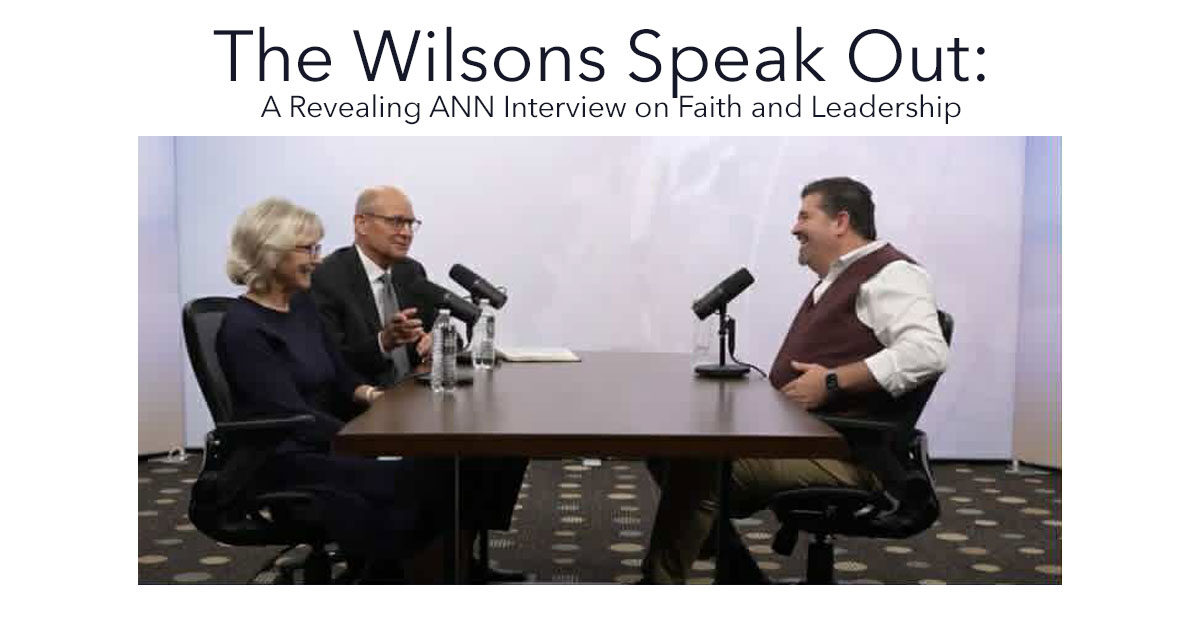The Wilsons Speak Out: A Revealing ANN Interview on Faith and Leadership
by Björn Karlman | 10 July 2025 |
Anyone who thought Ted Wilson planned on retreating to the shadows post-presidency was proved wrong today when Adventist News Network (ANN) published “Reflections From Our Former President Pastor Ted Wilson”—a lengthy interview with Ted and Nancy Wilson, hosted by Sam Neves, the newly elected associate director of Public Affairs and Religious Liberty (PARL) at the General Conference (GC).
Scriptural certainty and the limits of dialogue
In the interview, Ted Wilson reasserts his public presence and leadership philosophy, grounding every answer in his view of the Bible. He insists, “There is nothing in any way that measures up to the standard of the Word,” and repeatedly urges Adventists to “stay anchored in the Word.” For Wilson, the digital age is a source of doctrinal confusion and threat: “Social media is unbelievably powerful and unfortunately in many ways very corrupt…. People see certain things and then they start believing a lie.” His solution is not more conversation, but a return to official denominational sources and a wariness of independent voices: “It’s important for people to go to official church sources in order to find accurate news, as opposed to all kinds of salacious stuff that circulates everywhere.”
The message is clear: alternative perspectives—even within Adventism—are not only suspect but potentially dangerous.
Criticism: Endurance over engagement
Nancy Wilson reflects on the personal toll of public criticism and rumor especially at the start of her husband’s GC presidency: “I wanted to get up on the stage and set everyone straight, but I knew that wasn’t appropriate.” Over time, her strategy became “Just say quack-quack and let it roll off your back.” Ted Wilson spiritualizes the criticism, quoting Matthew 5 about being “reviled and persecuted… even on social media.” For the Wilsons, criticism appears to be something to be endured, not engaged with or learned from.
This posture, while fostering personal resilience, signals a reluctance to listen to different voices or to treat criticism as a potential source of growth.
Science, creation, and policing the margins
When the conversation turns to science and creation, Wilson is unequivocal: “When you read it in the Bible and you understand it literally… you have a great opportunity to showcase God’s precious Word.” He is explicit that those who advocate for evolution or even theistic evolution “are way off in the corners. They’re still there, many of them. But by God’s grace, his truth has been showcased because creation is a mark of his absolute power and authority.” While he describes efforts to empower Adventist scientists, he makes it clear that “our scientists first and foremost accept the Bible.”
Principle over popularity—but at the cost of conversation
Wilson is unwavering in how he frames his leadership: “Your allegiance is to Christ and his Word. And if you don’t have that as your foundation, you’re going to be swayed all over the world by popular opinion, by surveys, by polls that are taken…. No, you have to have an anchor completely in God’s Word.” He presents himself as willing to be unpopular for the sake of principle—a posture which often appears as inflexibility. Disagreement for Elder Wilson is often equated with disloyalty or error, and alternative voices, whether theological, scientific, or journalistic, are kept at arm’s length.
Tradition, mission, and what’s left unsaid
The Wilsons highlight traditional outreach: “revival and reformation, mission to the cities, comprehensive health ministry, the distribution of literature and in particular The Great Controversy”—rooted in the “Spirit of Prophecy, which of course comes back to scripture and the Bible.” Nancy Wilson affirms, “I believe in our message so profoundly that I’m happy to share the truth, because it’s our only strength…. Truth sets us free.”
The interview gives no attention to controversial topics such as women’s ordination, LGBTQ+ inclusion, or the positive role of independent voices encouraging accountability—areas where many Adventists have called for more openness and conversation.
Life beyond leadership
Wilson says he did not cry upon hearing the news he had not been elected to another term as president. Instead, the Wilsons say they look forward to a slower pace: they express relief at stepping back from the pressures of global leadership. “We are looking forward to slowing down, getting more sleep, not having to get up at 3:00 in the morning for early morning flights out…. We’ll keep on doing ministry, but at a different pace,” Nancy says. Ted adds, “There is a certain pressure and stress that is gone because you don’t have to be always on top of everything that’s going on.”
Looking forward
The interview reveals the Wilsons’ conviction and control. Elder Wilson’s leadership has been marked by an unyielding commitment to doctrinal purity and a clear sense of mission. But his refusal to seriously engage with other points of view—especially within the church—has often meant shutting down conversation rather than fostering it. The legacy is a church bureaucracy that values conformity and clarity, often at the expense of dialogue and inclusion. Those with differing perspectives, particularly in science and theology, remain “way off in the corners.”

Björn Karlman is the executive director of Adventist Today.




